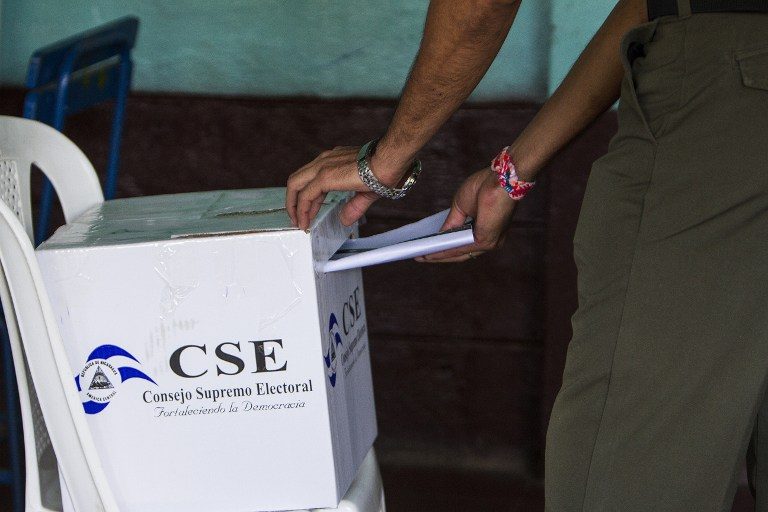SUMMARY
This is AI generated summarization, which may have errors. For context, always refer to the full article.

MANAGUA, Nicaragua – Nicaragua’s President Daniel Ortega and his extravagant wife, Rosario Murillo, looked likely to win elections Sunday, November 6, that would hand him a third straight term and cement her role as co-ruler.
Voting was taking place “in a calm and normal way” across the Central American nation of 6 million to select the president and lawmakers, Supreme Electoral Council chief Roberto Rivas told reporters.
Foreign observers were barred from monitoring the election, though some Organization of American States representatives and a couple of former presidents of Guatemala and Paraguay were invited to be present during voting.
Rivas defended the stance against monitors, saying that the legitimacy of Nicaragua’s elections “comes from the people, not from any foreigner.”
Polling was scheduled to close at 6 pm local time (0000 GMT Monday, November 7), with results expected around 5 hours later.
Voter intention surveys credit Ortega with an insurmountable lead over rivals.
The 70-year-old former Marxist rebel is wildly popular – especially with Nicaragua’s poor who account for more than a third of the population – for social programs and economic stability and security that has promoted vibrant growth.
Powerful first lady
If he triumphs, it would be Ortega’s fourth presidential mandate.
He has served two consecutive terms since 2007, and previously between 1985 and 1990, when his Sandinista National Liberation Front emerged victorious from a revolution that toppled a dictatorial dynasty.
Murillo, 65, already fills a prominent role as his government’s spokeswoman.
With Ortega increasingly reluctant to make public appearances, she has stepped up – wearing trademark colorful dresses and ostentatious jewelry – to represent the administration.
She has also left her mark on the capital, ordering the erection of tall, metal “trees of life” that decorate the main boulevard in bright colors.
Many observers believe “La Companera” (the companion), as she is known, already shares decisions with Ortega and could become president herself if he bows out, or in the next elections.
‘Couples in power’
“The practice of ‘couples in power’ is not exclusive to Nicaragua,” Veronica Rueda Estrada, a Nicaragua expert and professor at Mexico’s Quintana Roo University, told Agence France-Presse by email.
She called to mind Cristina Kirchner, who succeeded her husband Nestor Kirchner as president of Argentina, and Hillary Clinton in the United States, who is vying to become president with Bill Clinton by her side.
Looming economic problems for Nicaragua, notably a drying up of credit from troubled ally Venezuela, could bode badly for some pharaonic projects Ortega has proposed.
One major plan involves a Chinese company building a $50 billion cross-country canal to rival the one in Panama, contested by residents along the mooted waterway.
Opposition decries ‘farce’
The opposition, already weak and fractured, has been progressively sidelined by Ortega, the courts and electoral authorities.
Parts of it have called the elections a “farce” and urged Nicaraguans not to vote, making voter turnout an important element in the result.
An opposition member who lost his legislative seat by court order, Carlos Langrand, said there was “extremely high abstention” in some areas.
But the head of the National Council of Universities, which is accredited to monitor the vote, disputed that.
“There has been an excellent turnout,” Telemaco Talavera said, without providing figures.
Telavera is also spokesman for the national commission on the proposed canal.
A poll by Nicaraguan survey firm M&R said Ortega had 70% support, and turnout was predicted at 75%.
A survey by the CID-Gallup consultancy in neighboring Costa Rica offered a more muted picture – 52% for Ortega, with turnout at 58% – but still a comfortable margin over rivals. – Rappler.com
Add a comment
How does this make you feel?
There are no comments yet. Add your comment to start the conversation.